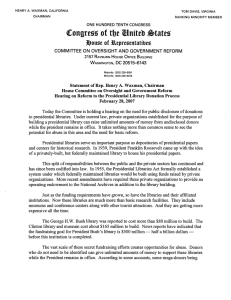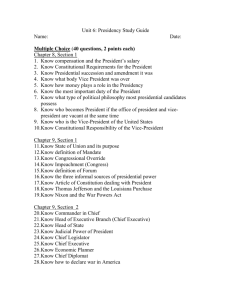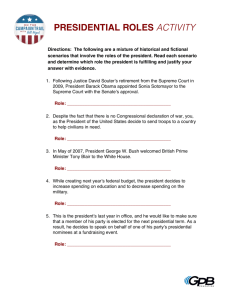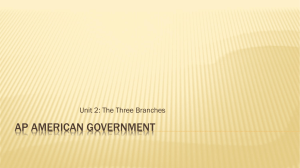Common Cause Before the House Committee on Oversight and Government Reform
advertisement
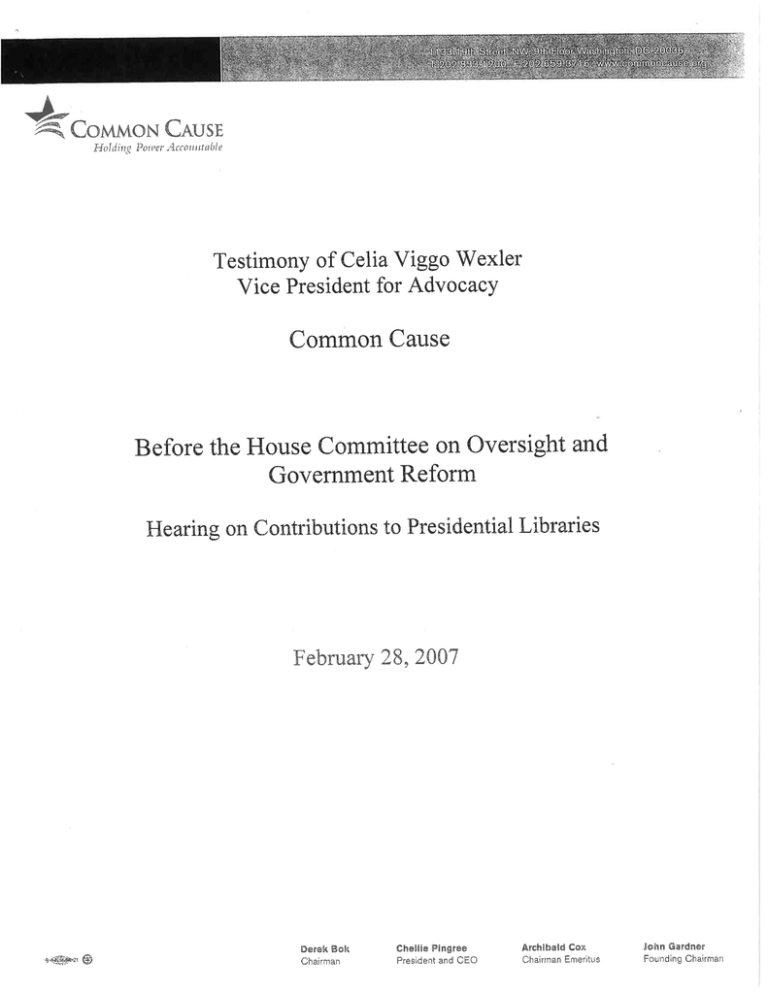
Testimony of Celia Viggo Wexler Vice President for Advocacy Common Cause Before the House Committee on Oversight and Government Reform Hearing on Contributions to Presidential Libraries Derek Bok Chairman Chellie Pingree President and CEO Brchlbald Cox Chairman Emeritus John Qardnea Founding Chairman Chairman Waxman, ranking Minority Member Davis, and members of the Committee: Common Cause appreciates the opportunity to testify before this committee on this issue. Over its 37-year history, Common Cause, and its 300,000 members and supporters, has been concerned about the influence of wealthy special interests on our politics and public policy. While there are disclosure requirements and limits for campaign contributions to presidential candidates, there are few, if any, restrictions, on the fundraising a president does to ensure his or her legacy. For this reason Common Cause strongly supports legislation now being drafted by Chairman Waxman that would require quarterly, full public disclosure of donations of $200 or more to presidential fundraising organizations. Wisely, this proposal requires disclosure beyond the time a president leaves office, ending only when the presidential library is dedicated and turned over to the National Archives & Records Administration. This proposal greatly enhances the public's access to information because it also requires that contribution information be made available in a timely manner on the Internet in a searchable, sortable, downloadable database, without any fee or access charges. This proposal would ensure, for the first time, the public knows the source of contributions to the presidential libraries intended to serve them. Typically, fundraising to construct a presidential library is done through a nonprofit foundation or group.' These nonprofit entities are free to seek donations from corporations, individuals, even foreign nationals and foreign governments. Sitting presidents may be actively involved in soliciting these contributions. There is no limit on the size of the donations, and no requirement that they be disclosed. A presidential library complex has become one of the vehicles for presidents to ensure that their Administrations are taken seriously, and also now provides a platform for presidents to continue work on issues they care about. Increasingly presidential libraries, and rile museums, cenrers and other instituiions iied iu ihem, have becume wiiai The JTashington Post termed testaments to "monumental ambition . . . hybrid research institutions, celebratory monuments/minor tourist attractions." Our campaign finance laws, particularly the ban on soft money, were supposed to sever the link between big donors and elected officials. But if sitting presidents are raising money in undisclosed, unlimited amounts for projects in which they are personally invested, wealthy special interests have unprecedented opportunities to seek access and influence at the White House and evade all public scrutiny. At the very least, the public deserves to know the amount of donations, the names, addresses and occupations of the donors, and the dates donations were made. Donations to presidential library complexes must be fully disclosed and accessible to the public. Presidential libraries' voluntary disclosure of their donors is incomplete at best. To our knowledge, no presidential library makes the names, dates, and specific amounts of donations accessible to the public over the Internet. Instead, calls to a presidential library may result in the caller receiving a list of donors. But our experience in trying to obtain this information is that the libraries, even if they provide a list of donors, do not report the amount of a specific donation to a presidential library, but rather place donations in a range, such as $1 million or more. Such information also does not include the date when the gift was made. Presidential libraries increasingly solicit and receive individual gifts that exceed hundreds of thousands of dollars. If presidential libraries were modest affairs, the lack of disclosure would not be so worrisome. But that is not the case. The first presidential library, housing the papers of Franklin D. Roosevelt, cost less than $400,000 to build, about $5 million adjusted for inflation. But since that time, presidential libraries have grown more and more ambitious and costly. The $26 million Carter library was succeeded by the $57 million Reagan library, followed in turn by the $83 million library complex for former President George H.W. Bush, and the $165 million Clinton library complex. George W. Bush's presidential library complex may cost as much as $500 million. To erect these major complexes is going to take more than the $25 to $50 donations that built Harry Tnunan's modest presidential library. Donations from individual donors can and have amounted to several million dollars. Presidents may raise unlimited funds for their libraries while in office, raising concerns about corruption or the appearance of corruption. President George H.W Bush did not actively f~lndraisewhile a sitting president, although it is difficult to tell whether any major donations were made while he was in office. But both Presidents Ronald Reagan and Bill Clinton courted potential donors for their libraries whiie in office. The plans for the George W. Bush library are just getting underway, but the current President may also want to raise some of the $500 million for his library complex, which may include a think tank, while he is still in office. As presidential historian Richard Norton Smith observed, a president's power to raise money ebbs after he loses power. "On January 20, the light gets switched off," Smith said. "It's like Cinderella's coach turning back into a Full and timely disclosure will enable the public to assess whether a donation may have influenced a presidential decision. This concern about links between presidential actions and library donations is not academic. We know that at least two presidential pardons have gone to individuals with ties to large donors to presidential libraries. In 1993, according to media reports, President George H.W. Bush pardoned Edwin L. Cox Jr., who pled guilty in 1988 to bank fraud, spent six months in jail, and paid $250,000 in fines. The U.S. Attorney overseeing the Cox case said he would have preferred that more time lapse before Cox received a pardon, which he deemed "premature." Eleven months later, Cox's father, a large donor to Republican causes, pledged to give at least $100,000 to the Bush Presidential ~ i b r a r ~ . ' e In 2001, Denise Rich, the former wife of fugitive financier, Marc Rich, who was accused of tax evasion, wire and mail fraud,5 pledged $450,000 to the Clinton library. Rich's friend, Clinton fund-raiser Beth Dozoretz, who also lobbied for the Rich pardon, pledged $1 million to the library.6 Shortly before he left office, President Clinton pardoned Rich. The Clinton pardon set off an uproar in part because Rich had never returned from Europe for his indictment, stood trial, or undergone any punishment. Both Presidents Bush and Clinton may have issued those pardons for reasons that had nothing to do with the library donations. (Israeli leaders Ehud Barak and Simon Peres had also interceded on Rich's behalf.18~utthe fact that the large donations were made gives the appearance of donors either wanting to have influence over the pardon process or wanting to thank a former president for a pardon that was granted. Public disclosure also is necessary for the public and the media to evaluate whether large corporate donations or major gifts from foreign governments and foreign nationals had any influence on other executive branch policies. Corporations, foreign governments and foreign nationals all have given millions of dollars in donations to the Bush, Carter and Clinton library complexes. Large donors include a wide range of foreign governments, foreign leaders, and foreign business interests including the Dubai Foundation, the Royal Saudi family, the Citizens of Kuwait, the Taiwan Economic & Cultural Office, and the Government of Japan. At a time when the U.S, role in the world has never been more challenging, may these donations cause potential conflicts of interest or the appearance of a conflict of interest? Without disclosure, citizens and Congress cannot truly evaluate the impact of presidential library fundraising on our politics and public policy. Disclosure is always the indispensable first step to comprehensive reform. Public disclosure should continue beyond a president's term in office. Former presidents do not fade away. Our three living former presidents are both active and influential. One, the father of a sitting president, also has taken on foreign policy roles, made public statements, and done high-profile humanitarian work. The other is the spouse of a presidential candidate and a sitting senator, who also maintains a high profile on the world stage. The third recently wrote a controversial book calling for a changing role for the U.S. in brokering a Mideast peace. Given their continued positions of influence and active public policy interests, Common Cause supports disclosure that extends at the very least until the bulk of fundraising for the structure and the endowment is completed, generally at the time the libraries are turned over to the National Archives and Records Administration to operate and maintaii~.~ We hope that Congress enacts this very positive legislative proposal. But we urge this Committee to thoughtfully consider other complexities and questions surrounding presidential libraries: Once a presidential library is donated to the National Archives & Records Administration, the federal government pays for its operation and upkeep. lo And presidential libraries are required by law to raise endowments whose size is linked to the size of the library. The endowments are used to offset a portion of the costs to maintain the library. Even so, maintaining ever larger and more ambitious libraries is an expensive endeavor, costing the government tens of millions of dollars each year." Should there,be public policy incentives to encourage presidents to erect more modest library complexes? Do we really need what author Robert Caro termed "America's pyramids, erected to the memory of the country's rulers?"12 @ a Q Does this pubiic-private partnership w o f ~ ?Or shouid, the government kite on i'ne task of building modest repositories for presidential records and papers, and divorce itself from presidents' increasingly ambitious plans to memorialize the achievements of their Administrations and to create a platform for launching their post-presidential careers? Shouid sitting presidents be prohibited from solicitiilg or accepting contributions or pledges of contributions to their presidential libraries? Or should there be any limits on the amount of contributions and pledges to presidential libraries while the president is in office? Should there be limits on donations from foreign governments and foreign nationals? Should the disclosure rule extend for a president's lifetime? Given the increasingly ambitious scope of presidential libraries and the museums, centers, and other entities linked to them, presidential fundraising may continue long after structures are built, and decades after a president held office. A case in point is President George H.W. Bush's eightieth birthday celebration. Those who wanted to attend his various birthday events were invited to become "benefactors" if they gave $1 million, granting them access to a private dinner hosted by the former President and his wife in the apartment of the Bush presidential library. Nineteen donors, including the Embassy of Qatar and The Washington Times Foundation, gave at that level. In all, former President Bush raised more than $55 million, a portion of which went to the George Bush Presidential Library Foundation. 13 We applaud the Committee for examining this issue and for its well-thought-out and reform-minded legislative proposal. We look forward to working with you on this and other issues in the inoiiths to come. I Testimony of Hon. Stephen Horn, chairman, before the House Committee on Government Reform Subcommittee on Government Efficiency, Financial Management and Intergovenrmental Relations, concerning H.R. 577, 5 Apr. 2001. Paula Span, "Monun~entalAmbition; Presidential Libraries are History and Hagiography," The Washington Post, 17 Feb. 2002. Ibid. 4 Michael Weisskopf, "A Pardon, A Presidential Library, A Big Donation," Time.com, 6 Mar. 2001. 5 Ted Koppel, "A Question of Access: Behind the Pardon of Marc Rich," ABC News Nightline, 28 Feb. 2001. 6 Statement of Rep. Dan Burton (R-IN), Hearing of the House Government Reform Committee on President Clinton's Pardons, 1 Mar. 2001. Jim Abrams, "House Seeks Disclosure for Donations to Presidential Libraries," Associated Press, 5 Feb. 2002. Ted ICoppel, "A Question of Access, Behind The Pardon of Marc Rich," ABC News Nightline, 28 Feb. 2001. "A Brief History of the Presidential Library System," The U.S. National Archives and Records Administration, www.arcllives.~ov. -10 Raymond Gselbracht and Timothy Walch, "The Presidential Libraries Act After 50 Years," The U.S. National Archives and Records Administration, Prologue, summer 2005. ' I Alexis Sirnendinger, "Trouble In The Library," The National Journal, 24 Feb. 2001. l 2 Paula Span, "Monumental Ambition; Presidential Libraries are History and Hagiography," The Washington Post, 17 Feb. 2002. l 3 Mike Allen, "Sky's No Limit; Bush 41 Malces His 8oth Something Special," The Wcrshington Post, 13 Jun. 2004.

